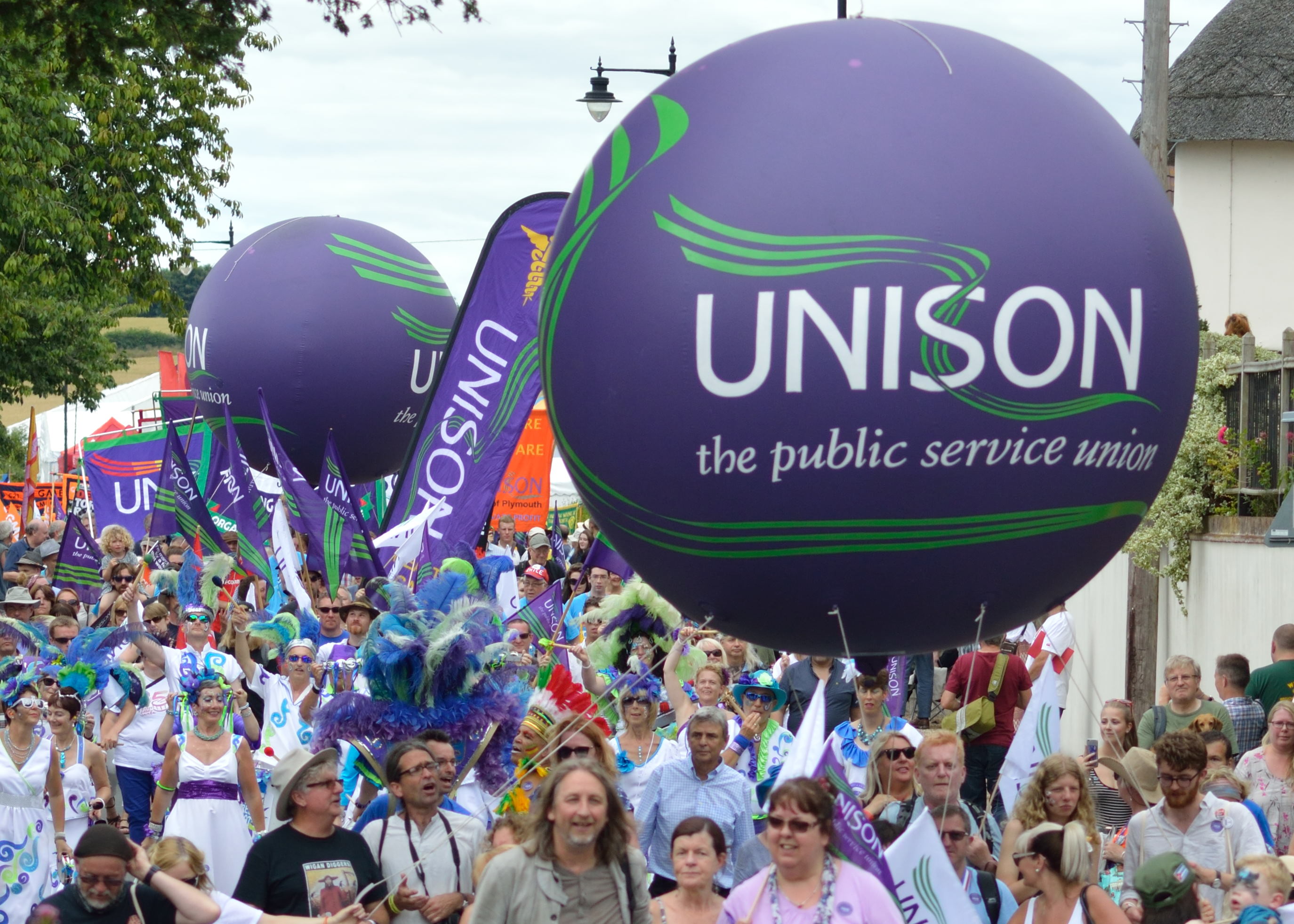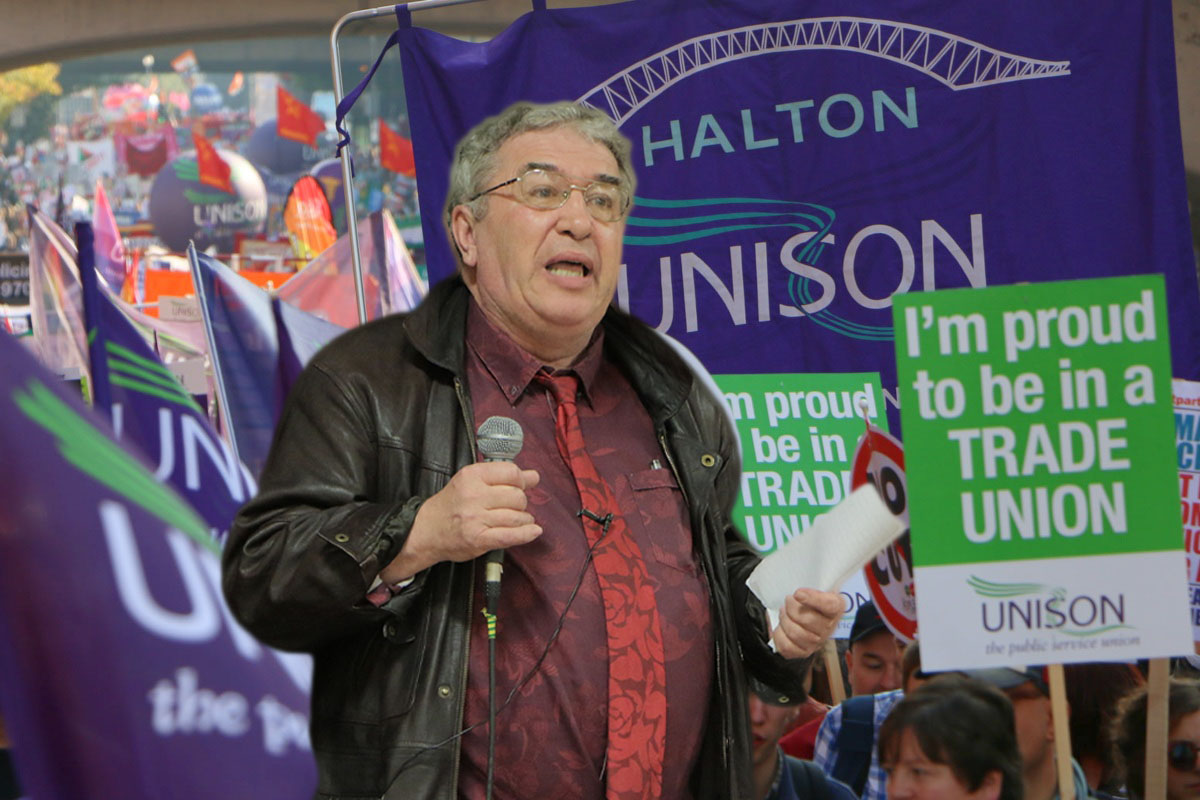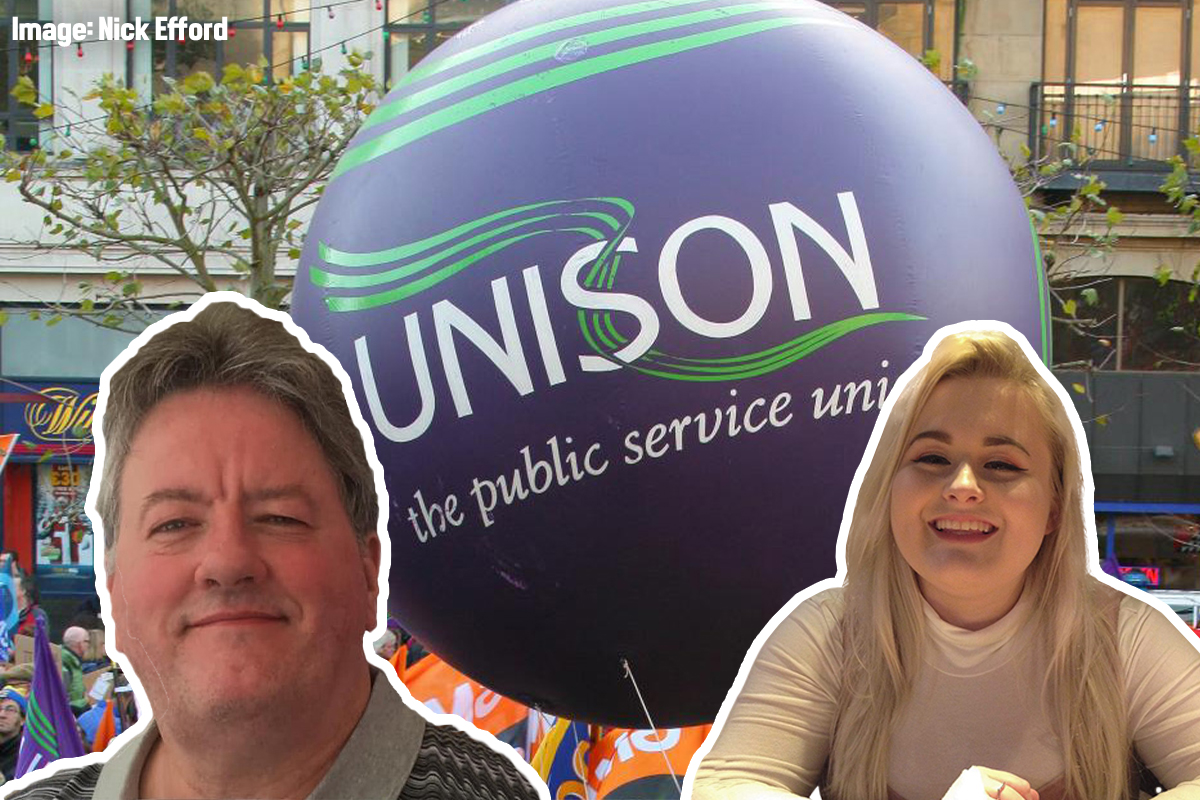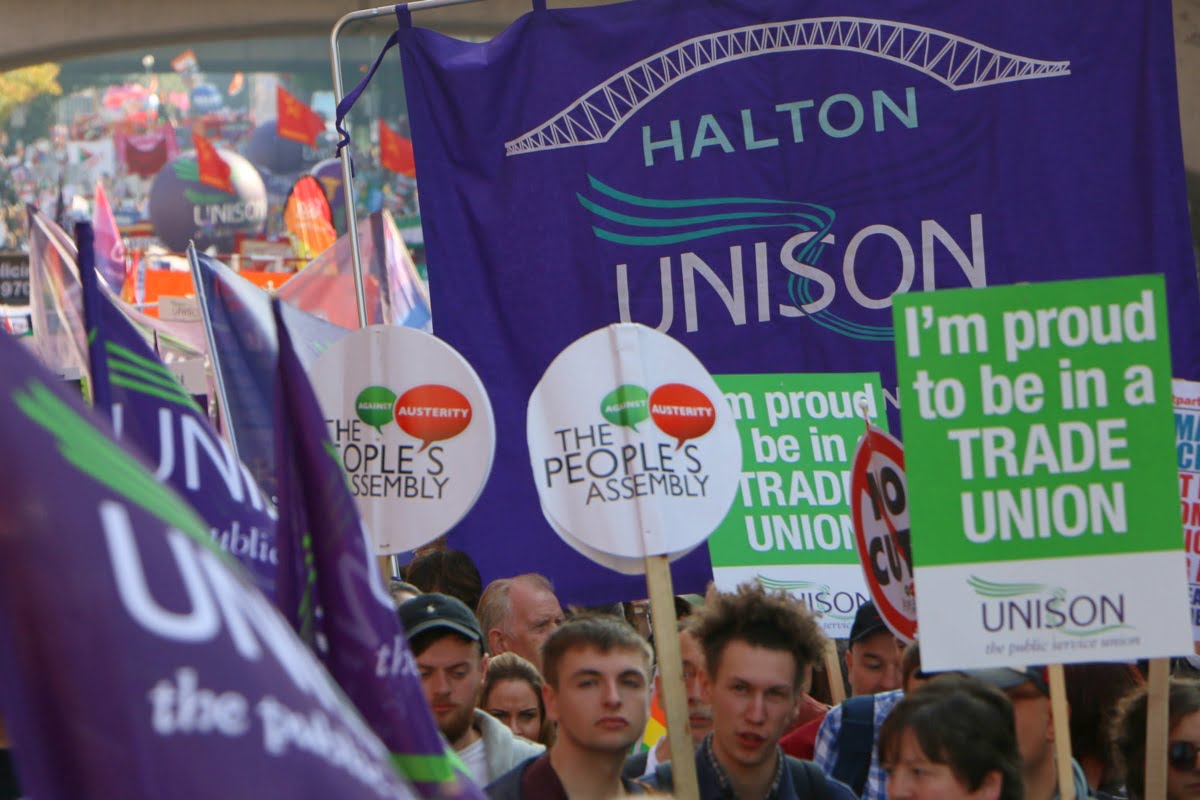Campaigning is currently underway in the Unison NEC elections, with a slate of grassroots activists standing. A sectarian approach by others, however, risks splitting the left vote. We urge union members to back #TimeForRealChange candidates.
In a few weeks’ time, an historic election will take place in Unison, the biggest union in the country. At the beginning of May, the ballot opens for the union’s National Executive Council (NEC), with 68 seats up for grabs. Crucially, the left has an opportunity to take control.
At present, the right-wing have a majority, but not a substantial one. This situation was clearly illustrated at an NEC meeting last autumn, when a debate was held over the NEC nomination for the Unison general secretary election.
The result was very close: 29 votes for the right wing’s continuity candidate; and 26 for the left candidate, Paul Holmes. In addition, there were a few abstentions.
The right wing only scraped the nomination through by a whisker, after the ballot was tied in the first round of voting; and after they had changed from the usual voting system, with no prior notice.
Decisive moment
 Unison is not only the biggest trade union in Britain – it also has a decisive position in the public sector. And the union plays an important role in the Labour Party, where it generally sides with the right wing. Significantly, it holds two seats on the Labour NEC.
Unison is not only the biggest trade union in Britain – it also has a decisive position in the public sector. And the union plays an important role in the Labour Party, where it generally sides with the right wing. Significantly, it holds two seats on the Labour NEC.
Over many years, the right-wing Unison leadership have paid lip service to the fight against low pay, and the struggle against cuts and privatisation.
The government’s announcement of a pay freeze in the public sector should have been a green light for the whole of the trade union movement – and especially Unison – to come out fighting. Instead, the Unison leadership simply asked the Tories to ‘do the right thing’.
Alongside the prospect of a pay freeze, we are also likely to see an avalanche of austerity in the wake of the pandemic. This ought to be enough to concentrate the minds of Unison members, and of members in all the other public sector trade unions as well.
At the same time, the recent Unison general secretary election saw the best performance by a left candidate in a generation. Put together, all these factors surely give particular importance to the forthcoming NEC elections.
Left slate
 In large measure, the left in Unison has been rising to the challenge. Some 56 left candidates – grouped loosely around the team behind the Paul Holmes general secretary campaign – are standing in the NEC election.
In large measure, the left in Unison has been rising to the challenge. Some 56 left candidates – grouped loosely around the team behind the Paul Holmes general secretary campaign – are standing in the NEC election.
This is the largest contingent of left candidates in many years. Last time around, in 2019, just 41 left candidates stood, winning 24 seats. With 68 seats to play for this time round, this means that the right wing had a head start, with many candidates standing unopposed.
The Paul Holmes campaign galvanised hundreds of new activists, and made a big splash on social media. In the end, Paul won some 45,220 votes. The left slate is now building on this advance.
Last time around, the left only stood two candidates across Wales, Scotland, Northern Ireland, and the Northern and Eastern regions. That situation has massively changed.
In the Northern region, for example, where the Broad Left in Unison has been in abeyance for many years, and where the right wing have been elected unopposed for at least the last two elections, the Paul Holmes campaign has mobilised left activists.
Thanks to this, two left candidates are on the ballot paper for the region in these NEC elections. These comrades also won the endorsement of the biggest Labour left organisation in the region.
This growth in activity and support for left candidates reflects not only the impact of Paul’s campaign, but also the mood amongst members; the fear of what the aftermath of the pandemic means in terms of jobs, wages, and services – both for workers, and for the people who rely on them.
Splits and sectarianism
Paul Holmes could have won the Unison general secretary position. But, shamefully, the left vote was split, allowing right-winger Christina McAnea to win.
Roger McKenzie, part of the union bureaucracy, attempted to pose as a ‘left’. Hugo Pierre also stood as a candidate, on behalf of the Socialist Party (SP), a small, ultra-left sect. In the process, Pierre received the lowest vote of any general secretary candidate in the history of the union.
The general secretary election came on the back of the retirement of Dave Prentis, who had been in office since 2000. Surely it was in the interests of the left to stand a single candidate? Surely the point of a left socialist candidate is first and foremost to advance the interests of the members?
This is elementary. But with at most a few dozen members in the union, the Socialist Party were primarily concerned about their prestige.
Their forces have been in decline for some time in Unison, and across the trade unions. Leading members, like Roger Bannister, have retired. Their organisation also suffered a damaging split in 2019, losing members in Britain and a large majority internationally.
Within Unison, the SP now have just four candidates on the NEC. This number has declined over the years. Standing a candidate in the general secretary election only managed to alienate many activists, who might otherwise have given them a hearing. Their campaign was seen as a distraction, at best; and as a wrecking tactic, at worst.
Time for real change
In these NEC elections, the Socialist Party are standing a handful of candidates, including for three seats that they already hold.
But scandalously, replicating their antics in the general secretary election, they are also standing against left candidates in seats currently held by right-wingers.
Once again, they are splitting the vote, potentially handing victory to right-wingers. Every seat counts in this election. Again, what are they hoping to achieve?
Out on a limb, eaten up by prestige politics, they are continuing in their sectarian ways. Due to their actions, they could rob the left of victory. They are playing with fire. Unison members looking for a way forward should turn their backs on such splitters.
Socialist Appeal supporters in Unison believe that the interests of members are best served by a vote in support of those candidates standing under the banner of #TimeForRealChange.
Unison elections: Support the grassroots slate! For a fighting leadership!
Our Unison correspondent
 The campaign to elect a new NEC in Unison, the largest union in Britain, is well underway. Grassroots candidates from every area of the public sector – in which Unison organises – are calling for a fighting leadership that can turn back the attacks that lie ahead.
The campaign to elect a new NEC in Unison, the largest union in Britain, is well underway. Grassroots candidates from every area of the public sector – in which Unison organises – are calling for a fighting leadership that can turn back the attacks that lie ahead.
All across the country, and in every sector where Unison organises, there is a clear need for a leadership that is prepared to struggle.
Attacks on the public sector are already occurring. Cash-strapped councils are using ‘fire-and-rehire’ tactics to pass cuts onto their workforces. The Tories are imposing a pay freeze on public sector workers. And further austerity will hit local government hard.
Given this, it is very encouraging to see the success of grassroots candidates, such as Lilly Boulby, who is standing for the National Young Members Female seat.
Putting forward a clear fighting programme, Lilly has secured 128 nominations from Unison branches across the country – a record number for a youth candidate.
Lilly has achieved this by standing on an unapologetically socialist platform. She has called for attention to the particular crisis facing young workers; the low pay and precarity across the public sector; and the mental health issues caused by stress, which especially affect NHS workers.
Socialist candidate Terry McPartlan also spoke to Socialist Appeal recently. He is standing in the North East Male seat. And like Lilly, Terry is arguing for Unison to use its full weight in the battles that members face.
“It’s unfortunate that there’s another candidate putting themselves forward and potentially splitting the left vote in the North East [see adjacent article],” Terry commented, “but that’s not my main focus.”
“The main task is to defeat the right wing here and everywhere; and to win a socialist leadership for Unison.”
These are just two of the 56 grassroots candidates who will be asking Unison members for their votes in the upcoming NEC elections.
Each of these candidates understands that the whole trade union movement must prepare for battle. The government has made it clear that they expect our class to pay for the current crisis.
Unison needs a leadership prepared to draw a line in the sand and fight uncompromisingly for its members and the wider working class.






